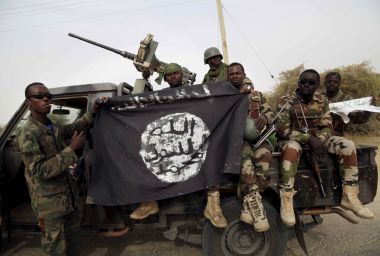Could football be the new religion for Islamic radicals?

Football has often been compared to religion. Thousands of people gather at a weekend ritual to express their devotion; there's a strong sense of community among followers who stand with hands raised to the heavens, eyes closed, singing their hearts out. It's easy to see: the players are the new gods, the stadiums are the new cathedrals.
If football is the new religion, then local derbies would be the training ground for militant extremists.
But now football is being used as an alternative to religious extremism. Islamic militants in Nigeria are playing football as part of the government's de-radicalisation programme.
Inmates who were formerly members of Nigeria's Boko Haram, which bans all sport, now take part in regular training sessions and matches within the walls of their prison to try and wean them off the poisonous ideology of extremist Islam.
"Before, they didn't tolerate others," Abioye Adeshina, who is in charge of sport at the prison told the BBC's Will Ross. "There is supposed to be a spirit of sportsmanship [in football] and it is this spirit that makes them normal and reduces their radical ideology."
Central to the countering violent extremism (CVE) programme is the idea of treating men convicted of terrorism with the hope that they can one day be reintegrated into Nigerian society. The approach involves a range of activities including sport, education and religious teaching by moderate immans.
One prisoner, who admitted to being a member of Boko Haram, confessed his attitude had changed since taking part in the de-radicalisation programme.
"When I came here, I wouldn't take orders from the prison staff," he said. "I was always arguing with them. I didn't consider them to be human beings.
"When the imams came, I thought they were hypocrites and I would abuse them. But despite my aggression they persevered and when I realised they were giving me respect, I started listening to them.
"As I talked with the imams, they convinced me that all that I had been doing was a mistake. I shed tears when I realised I had ruined my life. All my younger brothers are married with children but I'm not married and I have no child. So now I'm looking at how to start my life afresh."

The 'soft approach' to fight terrorism is being implemented alongside the Nigerian army's campaign against Boko Haram, who are most prevalent in the north east of the country.
The new counter-terrorism strategy was announced last year and is based upon the realisation that many members of Boko Haram did not join out of a religious commitment to jihad, but because they feel alienated from the rest of Nigerian society. A group claiming to offer opportunity as well as a just and fair world without corruption is an attractive option when the alternative of civilian life is so bleak.
There is little evidence of deep religiosity among many of the men, a psychologist involved on the programme said. Rather what distinguishes them from ordinary criminals is their level of anger. Typically these men have little education, subsistence work and few prospects.
"Ever since my childhood I have hated three things; lies, cheating and oppression," another inmate who spoke to the BBC said. "And those things became the order of the day for the government.
"So when this man came claiming to lead us towards a just and equitable society where those three things do not exist, I decided to join."
Additionally, those who join Boko Haram often do not have the skills or education to offer a counter narrative to the one propounded by a religious zealot. Educational reform, especially religious education, is urgently needed said Dr Fatima Akilu, the psychologist who designed the programme.
"The biggest surprise for me was how inadequate their level of ability to think and reason logically was," she said.
"We've got to teach religion, both Christianity and Islam, a lot better than we have been doing. A lot of kids just memorise the Koran, so we've got to understand the meaning of what they are memorising and we've got to do a lot better in terms of tolerance of other faiths," says Dr Akilu.
"So when someone says to you: 'My religion says that you should hate someone from another religion,' you can actually counter that."
Whether the programme will be a success will only be evident in the months and years to come as we measure the extent of radical Islam in West Africa. Many have ridiculed the programme arguing that because Islam's core texts appear to justify jihad in many ways, it is impossible to de-radicalise someone.
I am more optimistic, however. It is true that there are surahs in the Qur'an and Hadith that can be interpreted as condoning jihad. But given that so many join out of desperation and not because of genuine religious conviction, I believe there is hope.
And football might be it.











